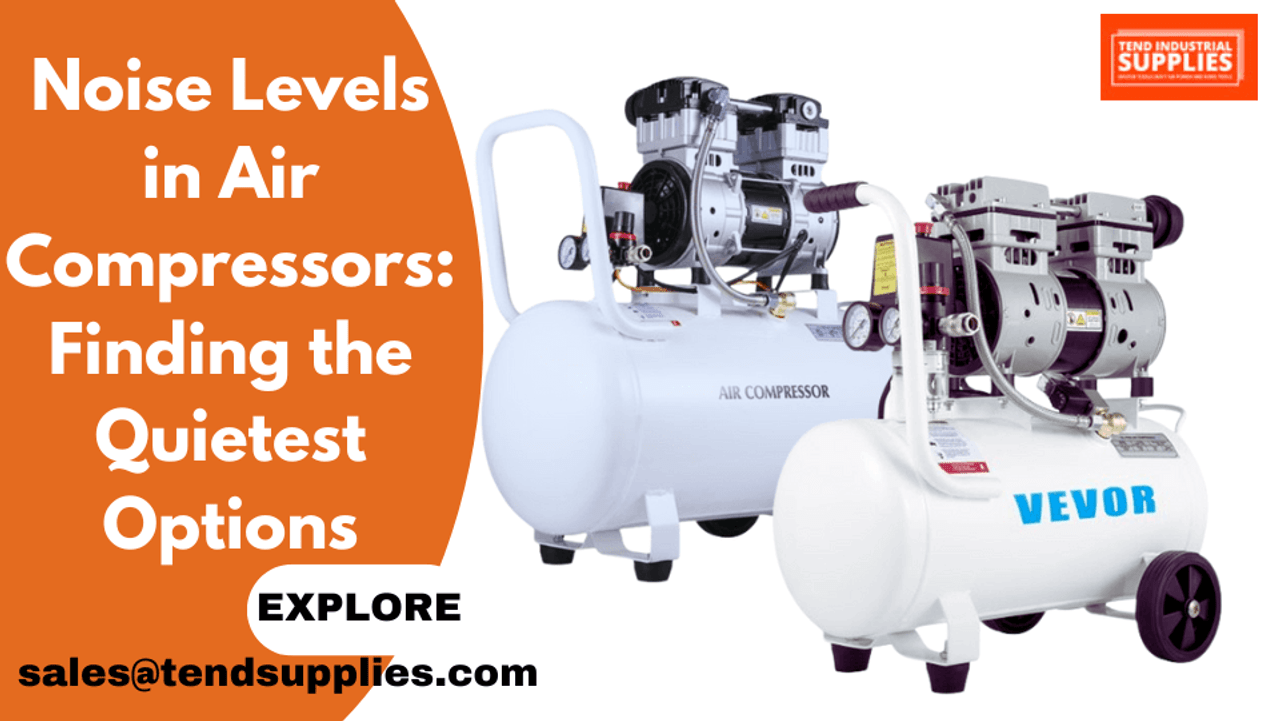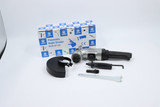Noise Levels in Air Compressors: Finding the Quietest Options
In industrial and commercial operations, air compressors play a crucial role in powering various tools and processes. However, one of the most significant challenges associated with air compressors is the noise they produce. Excessive noise can lead to workplace discomfort, reduced productivity, and even health issues for workers. This comprehensive guide will explore the importance of noise reduction in air compressors and help you identify the quietest options available.
Key Takeaway
Investing in quiet air compressors is not just about compliance or comfort—it's a strategic decision that can significantly impact workplace safety, productivity, and overall operational efficiency. By understanding the factors contributing to compressor noise, exploring the latest noise-reduction technologies, and implementing best practices, businesses can create a quieter, more productive work environment. Remember that the most peaceful option isn't always about finding the lowest decibel rating but rather about finding the right balance between noise level, performance, and specific application requirements.
Understanding Noise Levels in Air Compressors
Before diving into specific products and solutions, it's essential to understand how noise levels are measured and what they mean in the context of air compressors.
Decibel Scale and Noise Measurement
Noise levels are typically measured in decibels (dB). The decibel scale is logarithmic, which means that an increase of 10 dB represents a tenfold increase in sound intensity. Here's a quick reference:
- 0 dB: Threshold of hearing
- 30 dB: Whisper
- 60 dB: Normal conversation
- 80 dB: Busy street traffic
- 90 dB: Lawnmower
- 100 dB: Chainsaw
- 120 dB: Threshold of pain
Air compressor noise levels can range from as low as 40 dB for ultra-quiet models to over 90 dB for industrial-grade compressors.
Impact of Noise on Workplace Environment
Excessive noise in the workplace can have several negative effects:
- Hearing Damage: Prolonged exposure to noise levels above 85 dB can lead to permanent hearing loss.
- Stress and Fatigue: Constant noise can increase stress levels and cause fatigue among workers.
- Reduced Productivity: Noisy environments can make it difficult for workers to concentrate and communicate effectively.
- Safety Hazards: Excessive noise can mask important audio cues, potentially leading to accidents.
- Regulatory Compliance: Many jurisdictions have strict regulations regarding workplace noise levels.
Related Articles
‘Comparing Air Compressors: Which One Suits Your Workshop…
2024's Leading Air Compressors - Tend Industrial supplies
6 Best Budget Air Compressors for 2024: Power Up Your Projects Without Breaking Bank ..
Electric vs Gas Air Compressors: A Comprehensive Guide.
Demystifying Air Compressors: How Do They Work?
Factors Affecting Air Compressor Noise Levels
Several factors contribute to the noise produced by air compressors:
1. Compression Method
Different types of compressors produce varying levels of noise:
- Reciprocating Compressors: Generally the noisiest due to the piston movement.
- Rotary Screw Compressors: Typically quieter than reciprocating models.
- Centrifugal Compressors: Often the quietest, but usually only available in larger sizes.
2. Motor Type and Speed
- Oil-lubricated Motors: Generally quieter than oil-free models.
- Lower RPM Motors: Produce less noise compared to high-speed motors.
3. Pump Design
- Number of Cylinders: Single-cylinder designs are often noisier than multi-cylinder models.
- Balanced Pumps: Reduce vibration and noise.
4. Enclosures and Soundproofing
- Sound-dampening Enclosures Can significantly reduce noise levels.
- Rubber Mounts: Isolate vibrations from the compressor body.
5. Size and Capacity
Larger compressors tend to be noisier due to their increased power output.
Technologies and Designs for Noise Reduction
Manufacturers employ various technologies and design elements to reduce air compressor noise:
1. Advanced Motor Designs
- Brushless DC Motors: Offer quieter operation and improved efficiency.
- Inverter-driven Motors: Allow for variable speed operation, reducing noise during lower demand periods.
2. Innovative Pump Designs
- Multi-stage Compression: Distributes the compression process, reducing overall noise.
- Scroll Compressors: Use a spiral mechanism for quieter operation.
3. Sound-Dampening Materials
- Acoustic Foam: Absorbs sound waves within the compressor enclosure.
- Composite Materials: Provide both structural integrity and noise reduction.
4. Vibration Isolation
- Advanced Mounting Systems: Use rubber or spring mounts to isolate vibrations.
- Flexible Connectors: Reduce vibration transfer through air lines.
5. Intelligent Control Systems
- Smart Cycling: Optimize compressor cycling to reduce noise during periods of low demand.
- Load/Unload Control: Minimize noise during unloaded operation.
Quietest Air Compressor Options by Category
Let's explore some of the quietest air compressor options available in different categories:
Portable Air Compressors (40-60 dB)
- Ultra-Quiet Pancake Compressor
- Noise Level: 40-45 dB
- Capacity: 1-2 CFM @ 90 PSI
- Best for: Small workshops, indoor use, sensitive environments
- Low-Noise Piston Compressor
- Noise Level: 55-60 dB
- Capacity: 2-4 CFM @ 90 PSI
- Best for: Light-duty professional use, home garages
Stationary Workshop Compressors (60-70 dB)
- Quiet Rotary Screw Compressor
- Noise Level: 62-68 dB
- Capacity: 10-30 CFM @ 100 PSI
- Best for: Small to medium workshops, light industrial use
- Low-Noise Two-Stage Piston Compressor
- Noise Level: 65-70 dB
- Capacity: 15-40 CFM @ 175 PSI
- Best for: Automotive shops, medium-sized industrial applications
Industrial Air Compressors (70-80 dB)
- Variable Speed Rotary Screw Compressor
- Noise Level: 70-75 dB
- Capacity: 100-500 CFM @ 100-150 PSI
- Best for: Large industrial facilities, continuous operation
- Oil-Free Scroll Compressor
- Noise Level: 75-80 dB
- Capacity: 20-50 CFM @ 100-150 PSI
- Best for: Clean air applications, medical facilities, food processing
Best Practices for Reducing Air Compressor Noise
Even with quiet air compressors, implementing these best practices can further reduce noise levels:
- Proper Installation
- Install compressors on a solid, level surface to minimize vibrations.
- Use vibration-dampening mats or pads under the compressor.
- Regular Maintenance
- Keep all components well-lubricated to reduce friction and noise.
- Tighten loose parts that may cause rattling or vibrations.
- Optimize Air System
- Use appropriate pipe sizes to reduce air velocity and associated noise.
- Install air receivers to stabilize pressure and reduce compressor cycling.
- Strategic Placement
- Locate compressors away from work areas when possible.
- Consider outdoor installation with weather protection for larger units.
- Sound Enclosures
- Build or purchase sound enclosures for existing compressors.
- Ensure proper ventilation within enclosures to prevent overheating.
- Intake Silencers
- Install intake silencers to reduce noise from air intake.
- Exhaust Mufflers
- Use exhaust mufflers to quiet the air discharge process.
Measuring and Monitoring Compressor Noise
To ensure your air compressor system maintains low noise levels:
- Regular Noise Assessments
- Use a decibel meter to measure noise levels periodically.
- Create a noise map of your facility to identify problem areas.
- Predictive Maintenance
- Monitor changes in noise levels as they may indicate wear or potential failures.
- Employee Feedback
- Encourage workers to report any unusual noises or excessive loudness.
- Professional Audits
- Consider hiring acoustic specialists for comprehensive noise evaluations.
The Cost-Benefit Analysis of Quiet Air Compressors
While quieter air compressors often come with a higher price tag, it's essential to consider the long-term benefits:
- Improved Worker Health and Safety
- Reduced risk of hearing damage and associated worker's compensation claims.
- Lower stress levels and improved overall well-being for employees.
- Increased Productivity
- Better communication in quieter work environments.
- Improved concentration and reduced fatigue among workers.
- Regulatory Compliance
- Avoid fines and penalties associated with violating noise regulations.
- Easier compliance with OSHA and other workplace safety standards.
- Extended Equipment Life
- Quieter compressors often have advanced designs that can lead to longer operational life.
- Energy Efficiency
- Many noise-reduction technologies also improve energy efficiency, leading to lower operating costs.
Case Studies: Successful Noise Reduction in Industrial Settings
Case Study 1: Automotive Manufacturing Plant
Challenge: High noise levels in the assembly area due to multiple air-powered tools.
Solution:
- Replaced old piston compressors with modern rotary screw compressors
- Installed a centralized compressor room with sound-dampening enclosures
- Implemented a variable speed drive system to match air supply with demand
Results:
- 15 dB reduction in overall noise levels
- 20% increase in energy efficiency
- Improved worker satisfaction and reduced fatigue-related errors
Case Study 2: Woodworking Shop
Challenge: Noise complaints from neighboring businesses due to continuous compressor operation.
Solution:
- Upgraded to an ultra-quiet, oil-free scroll compressor
- Built a custom sound enclosure with proper ventilation
- Installed an larger air receiver to reduce compressor cycling
Results:
- Noise levels reduced from 85 dB to 68 dB
- Eliminated noise complaints from neighbors
- Improved air quality due to oil-free operation
Future Trends in Quiet Air Compressor Technology
As technology advances, we can expect to see further innovations in quiet air compressor design:
- Advanced Materials: Development of new materials with superior sound-dampening properties.
- AI-Driven Noise Control: Intelligent systems that continuously optimize operation for minimal noise.
- Magnetic Bearings: Elimination of metal-on-metal contact for ultra-quiet operation.
- Hybrid Compression Technologies: Combining different compression methods for optimal efficiency and noise reduction.
- Integrated Noise Cancellation: Active noise cancellation technologies built into compressor systems.
Regulatory Landscape and Compliance
Understanding and complying with noise regulations is crucial for businesses:
- OSHA Standards: Current permissible exposure limit is 90 dBA for an 8-hour day.
- European Directives: The EU Noise Directive sets exposure limit values and action values.
- Local Regulations: Many municipalities have specific noise ordinances that may apply.
- Industry-Specific Standards: Some industries may have additional noise requirements.
Ready to quiet down your operations with efficient, low-noise air compressors? Contact Tend Industrial Supplies at sales@tendsupplies.com or visit tendsupplies.com to explore our range of quiet air compressor solutions. Our experts can help you select the perfect balance of performance and noise reduction for your needs, ensuring a more comfortable and productive work environment. Don't let noisy compressors disrupt your operations – take the first step towards a quieter workplace with Tend Industrial Supplies today!









